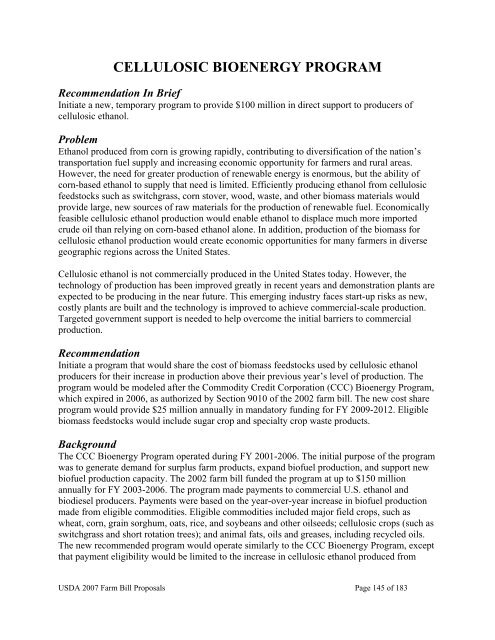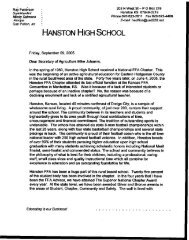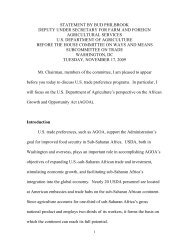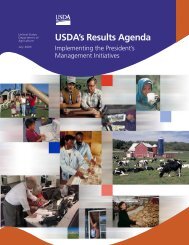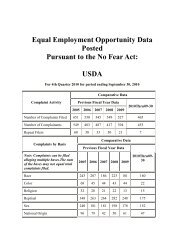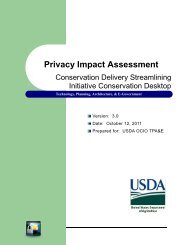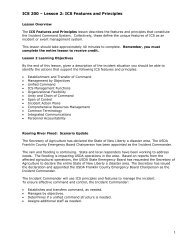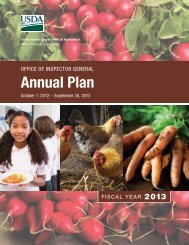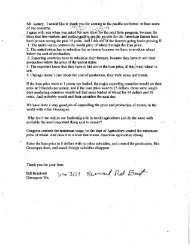USDA 2007 Farm Bill Proposals - US Department of Agriculture
USDA 2007 Farm Bill Proposals - US Department of Agriculture
USDA 2007 Farm Bill Proposals - US Department of Agriculture
You also want an ePaper? Increase the reach of your titles
YUMPU automatically turns print PDFs into web optimized ePapers that Google loves.
CELLULOSIC BIOENERGY PROGRAMRecommendation In BriefInitiate a new, temporary program to provide $100 million in direct support to producers <strong>of</strong>cellulosic ethanol.ProblemEthanol produced from corn is growing rapidly, contributing to diversification <strong>of</strong> the nation’stransportation fuel supply and increasing economic opportunity for farmers and rural areas.However, the need for greater production <strong>of</strong> renewable energy is enormous, but the ability <strong>of</strong>corn-based ethanol to supply that need is limited. Efficiently producing ethanol from cellulosicfeedstocks such as switchgrass, corn stover, wood, waste, and other biomass materials wouldprovide large, new sources <strong>of</strong> raw materials for the production <strong>of</strong> renewable fuel. Economicallyfeasible cellulosic ethanol production would enable ethanol to displace much more importedcrude oil than relying on corn-based ethanol alone. In addition, production <strong>of</strong> the biomass forcellulosic ethanol production would create economic opportunities for many farmers in diversegeographic regions across the United States.Cellulosic ethanol is not commercially produced in the United States today. However, thetechnology <strong>of</strong> production has been improved greatly in recent years and demonstration plants areexpected to be producing in the near future. This emerging industry faces start-up risks as new,costly plants are built and the technology is improved to achieve commercial-scale production.Targeted government support is needed to help overcome the initial barriers to commercialproduction.RecommendationInitiate a program that would share the cost <strong>of</strong> biomass feedstocks used by cellulosic ethanolproducers for their increase in production above their previous year’s level <strong>of</strong> production. Theprogram would be modeled after the Commodity Credit Corporation (CCC) Bioenergy Program,which expired in 2006, as authorized by Section 9010 <strong>of</strong> the 2002 farm bill. The new cost shareprogram would provide $25 million annually in mandatory funding for FY 2009-2012. Eligiblebiomass feedstocks would include sugar crop and specialty crop waste products.BackgroundThe CCC Bioenergy Program operated during FY 2001-2006. The initial purpose <strong>of</strong> the programwas to generate demand for surplus farm products, expand bi<strong>of</strong>uel production, and support newbi<strong>of</strong>uel production capacity. The 2002 farm bill funded the program at up to $150 millionannually for FY 2003-2006. The program made payments to commercial U.S. ethanol andbiodiesel producers. Payments were based on the year-over-year increase in bi<strong>of</strong>uel productionmade from eligible commodities. Eligible commodities included major field crops, such aswheat, corn, grain sorghum, oats, rice, and soybeans and other oilseeds; cellulosic crops (such asswitchgrass and short rotation trees); and animal fats, oils and greases, including recycled oils.The new recommended program would operate similarly to the CCC Bioenergy Program, exceptthat payment eligibility would be limited to the increase in cellulosic ethanol produced from<strong><strong>US</strong>DA</strong> <strong>2007</strong> <strong>Farm</strong> <strong>Bill</strong> <strong>Proposals</strong> Page 145 <strong>of</strong> 183


